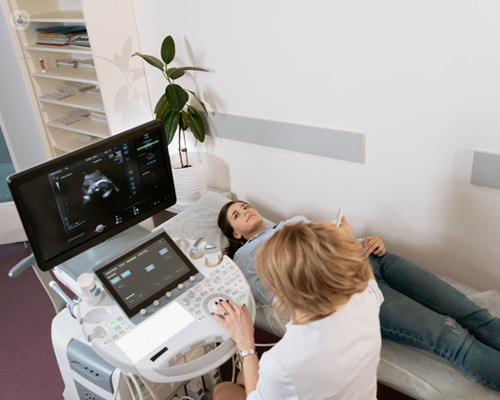Abdominal ultrasound
Dr Richard Sarsam - Gastroenterology
Created on: 11-04-2015
Updated on: 05-31-2023
Edited by: Karolyn Judge
What is an abdominal ultrasound?
An abdominal ultrasound is a diagnostic imaging test that uses ultrasound waves to examine the internal organs of the abdomen, such as:
- the kidneys;
- liver;
- spleen;
- gallbladder, or;
- pancreas.
The blood vessels that reach some organs, such as the aorta or vena cava, can also be visualised using an abdominal ultrasound.

What happens during the abdominal ultrasound procedure?
You will need to lie down while a specialist applies a clear, water-based conductive gel to your stomach area. They will then pass a manual probe over your abdomen, from which high-frequency sound waves will transmit images of the structures and organs in your body to a screen.
The specialist may ask you to adjust your position so they can study different areas of your abdomen. The abdominal ultrasound procedure usually lasts for around 30 minutes.
Unlike CT scans and x-rays, an ultrasound scan does not expose you to harmful radiation.
Why is an abdominal ultrasound performed?
A doctor may order an abdominal ultrasound if they are concerned about your abdominal symptoms. It can help them in diagnosing conditions such as:
- Abdominal pain;
- Kidney infections;
- Ascites;
- Tumours and cancers
- Swelling of an abdominal organ
- Gallbladder or kidney stones
- Abdominal fluid
- Appendicitis
How do I prepare for an abdominal ultrasound?
The type of preparation depends on the condition or problem the patient has, although in general, you should not eat or drink anything for several hours before an abdominal ultrasound. In an emergency, doctors perform an abdominal ultrasound without any preparation.
What can you feel during the abdominal ultrasound exam?
During the abdominal ultrasound exam, you may have to change position so that the specialist can see different areas of your abdomen, and you may have to hold your breath for short periods. The conductive gel may feel a little cold and wet, but the test should not cause any discomfort.
What type of specialist performs an abdominal ultrasound?
A doctor responsible for performing an abdominal ultrasound is typically a gastroenterologist.




